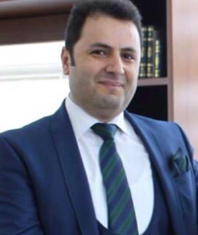| Biography | |
|---|---|
 Prof. Bayram G"UND"UZ Mus Alparslan University, Turkey |
|
| Title: Comparisons of Theoretical and Experimental Optoelectronic Properties of the Organic Semiconductor | |
| Abstract: Organic semiconductors (OSCs) have widely investigated due to excellent electronic, photovoltaic, optical, photonic, luminescence, optoelectronic and applied science properties. In this talk, we will talk on comparisons of theoretical and experimental optoelectronic properties of the organic semiconductor. For this, experimental and advanced computational technique were performed to investigate various properties of the organic semiconductor. UV and FTIR spectra, photonic and fluorescence properties were analyzed by using experimental and advanced computational technique. SEM images of the organic semiconductor were obtained and investigated in detail.
Fig. 1. SEM image of the organic semiconductor.
Acknowledgments: This study was supported by “The Management Unit of Scientific Research Projects of Mus Alparslan University (MUSBAP) under Project BAP-17-EMF-4901-09. | |
| Biography: Dr. Bayram Gunduz received his bachelor’s degree in Physics from Firat University, Elazig, Turkey, 2001–2005, master degree from Solid State Physics, Firat University, 2005–2007, PhD degree from Solid State Physics, Firat University, 2007–2011. He was research assistant in Solid State Physics, Mus Alparslan University, Turkey, 2009–2011 and was Assist. Prof. Dr. in Department of Science Education, Mus Alparslan University, 2011–2017. He is currently an Assoc. Prof. Dr. in the same department and university, since October 2017. His main achievements include organic semiconductors and materials: (i) electrical, optical and optoelectronic properties; (ii) electronic and optoelectronic devices/applications of organic semiconductors such as Schottky diode, P–N heterojunction diode, metal–insulator–semiconductor junctions, solar cells, thin-film transistor, photodiode. (B) He has many articles (around 60) published in SCI, SCI-Exp journals, which have high impact factors and has about 450 citations to his studies. | |

